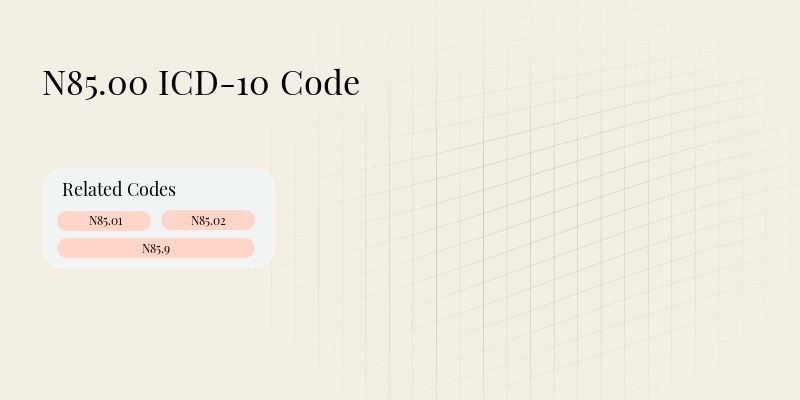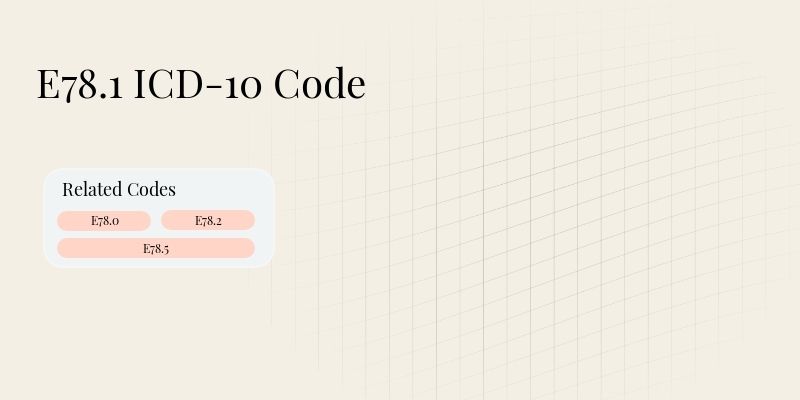
N85.00 ICD-10 Code: Thickened Endometrium

Key Takeaways
- What N85.00 ICD-10 Code Covers: This code is primarily used for diagnosing thickened endometrium, which is often investigated in patients presenting with abnormal uterine bleeding or other gynecological symptoms.
- Session duration requirements: The duration of the session can vary; however, a comprehensive evaluation typically requires a minimum of 30 minutes to assess symptoms and conduct appropriate imaging tests.
- Who can use the code: This code can be utilized by gynecologists, primary care physicians, and any healthcare professionals involved in women’s health, particularly those specializing in reproductive endocrinology.
- Best practice for proper use: Accurate documentation is essential—include symptom descriptions, imaging results, and clinical findings to support the diagnosis of thickened endometrium.
- Example of actual usage: A patient presenting with menorrhagia undergoes a transvaginal ultrasound, which shows a thickened endometrium, leading to the assignment of N85.00 for billing and coding purposes.
What is N85.00 ICD-10 Code
The N85.00 ICD‑10 code refers to the diagnosis of thickened endometrium, which is characterized by an abnormal increase in the thickness of the endometrial lining of the uterus. This condition can arise due to various factors, including hormonal imbalances, polyps, or underlying pathologies such as endometrial hyperplasia.
Clinically, thickened endometrium is often assessed in women experiencing abnormal uterine bleeding, pelvic pain, or infertility. Appropriate evaluation is crucial as it may indicate benign or malignant processes, necessitating further diagnostic measures or interventions.
Services Covered Under N85.00 ICD-10 Code
This code encompasses a variety of services related to the diagnosis and management of thickened endometrium. The following table outlines the services typically covered:
Service | Description | Typical Procedure Codes |
|---|---|---|
Transvaginal Ultrasound | An imaging test used to evaluate the thickness of the endometrium. | 76830 |
Endometrial Biopsy | A procedure to collect tissue samples from the endometrium for further examination. | 58100 |
Pelvic Examination | A physical examination to assess for abnormalities in the reproductive organs. | 99213 |
Hormonal Evaluation | Tests to assess hormonal levels that may contribute to thickened endometrium. | 83001 |
Who Can Use the N85.00 ICD-10 Code?
This code can be employed by a variety of healthcare providers involved in diagnosing and managing conditions related to the female reproductive system. Below are key users:
- Gynecologists: Specialists who primarily focus on women's reproductive health and manage conditions like thickened endometrium.
- Primary Care Physicians: General practitioners who may initially evaluate and refer patients experiencing related symptoms.
- Reproductive Endocrinologists: Experts in hormonal disorders affecting reproduction, who further investigate cases of abnormal endometrial thickening.
- Obstetricians: Doctors who may encounter this condition in pregnant patients or those seeking preconception care.
How to Use N85.00 ICD-10 Code
Correct application of this code is essential for accurate billing and appropriate patient management. Below are steps and examples:
- Document Symptoms: Record detailed patient complaints like heavy menstrual bleeding or pelvic discomfort. For example, a patient reports heavy periods lasting more than seven days.
- Include Diagnostic Imaging Results: Use findings from ultrasounds or biopsies to support the diagnosis. For instance, ultrasound results indicate an endometrial thickness of greater than 5mm.
- Link to Treatment Plan: Clearly outline any treatments or follow-ups recommended based on findings. An example could be scheduling a follow-up appointment after a biopsy to discuss results.
Reimbursement Rates for N85.00 ICD-10 Code
The reimbursement landscape can vary significantly based on insurance types. Below is a comparison table:
Insurance Type | Reimbursement Rate |
|---|---|
Medicare | $85 - $120 |
Medicaid | $70 - $100 |
Private Insurance | $100 - $150 |
Disclaimer: Reimbursement rates change frequently and can depend on various factors including geographical location, specific insurance plans, and provider agreements. This article will be updated with average prices accordingly.
Benefits of N85.00 ICD-10 Code
Understanding the benefits of this code is vital for proper coding practice. The following table outlines key advantages:
Benefit | Description |
|---|---|
Accurate Diagnosis | Enables healthcare professionals to identify and manage conditions related to thickened endometrium effectively. |
Improved Patient Care | Facilitates appropriate treatment plans based on accurate documentation and coding. |
Enhanced Reimbursement | Ensures that providers receive proper compensation for services rendered. |
Common Mistakes to Avoid with N85.00 ICD-10 Code
Misuse of this code can lead to audits and claims denials. Below are common mistakes to be aware of:
- Incorrect Symptom Documentation: Failing to accurately record symptoms can lead to improper coding. For example, not specifying the duration or severity of bleeding may result in denial.
- Inadequate Imaging Support: Omitting imaging results in documentation can weaken the claim. An instance could be submitting a claim without the ultrasound report showing thickened endometrium.
- Failure to Link to Treatment: Not connecting the diagnosis with a planned treatment may raise red flags during audits. For example, if a biopsy is performed but not documented as part of the treatment plan.
- Misapplication of Code: Using this code for conditions unrelated to thickened endometrium can lead to serious issues. For example, coding it for a patient with normal endometrial thickness due to misinterpretation of ultrasound results.
N85.00 ICD-10 Code vs other codes
Comparing this code with others helps clarify its specific application. Below is a comparison of similar codes:
Code | Description | Key Differences |
|---|---|---|
N85.00 | Thickened Endometrium | Specifically addresses abnormal endometrial thickness. |
N85.01 | Endometrial Hyperplasia without Atypia | Indicates hyperplasia without abnormal cells, a different condition. |
N85.02 | Endometrial Hyperplasia with Atypia | Refers to hyperplasia with abnormal cells, necessitating different management. |
Conclusion
In summary, the N85.00 ICD‑10 code is critical for accurately diagnosing thickened endometrium, which is essential for managing various gynecological conditions. Understanding its appropriate usage, documentation requirements, and reimbursement implications is vital for healthcare professionals. The code not only aids in clinical decision‑making but also ensures accurate billing practices, impacting both patient care and provider revenue.
Disclaimer: This article is for informational purposes only and does not constitute legal or medical advice. Always consult professional guidelines and regulatory bodies for specific compliance requirements.
Frequently Asked Questions
Reduce burnout,
improve patient care.
Join thousands of clinicians already using AI to become more efficient.

E78.1 ICD-10 Code: Hypertriglyceridemia
Discover essential insights on the E78.1 ICD-10 Code code for health professionals. Enhance your practice and navigate billing with confidence.

F90.9 ICD-10 Code: Attention Deficit Hyperactivity Disorder
Discover essential insights on the F90.9 ICD-10 Code code for health professionals. Enhance your practice and navigate billing with confidence.

F33.2 ICD-10 Code: Major Depressive Disorder
Discover essential insights on the F33.2 ICD-10 Code code for health professionals. Enhance your practice and navigate billing with confidence.
